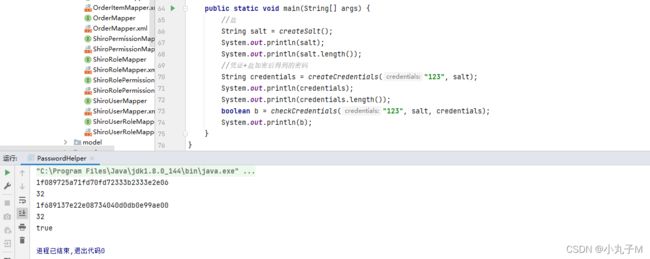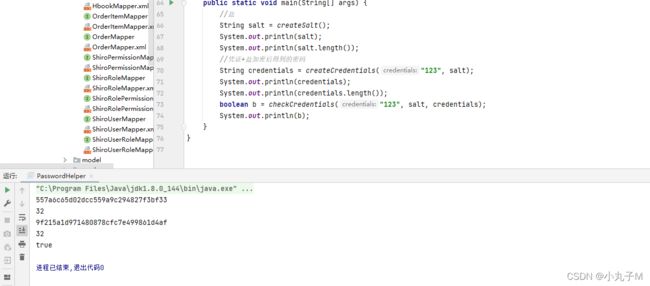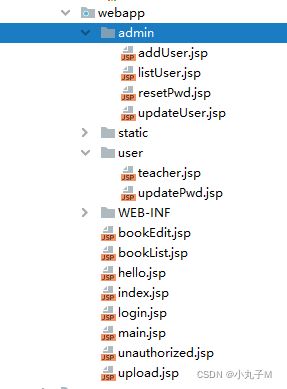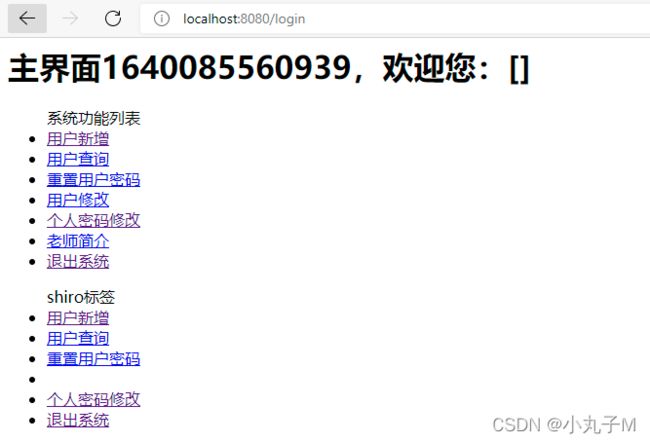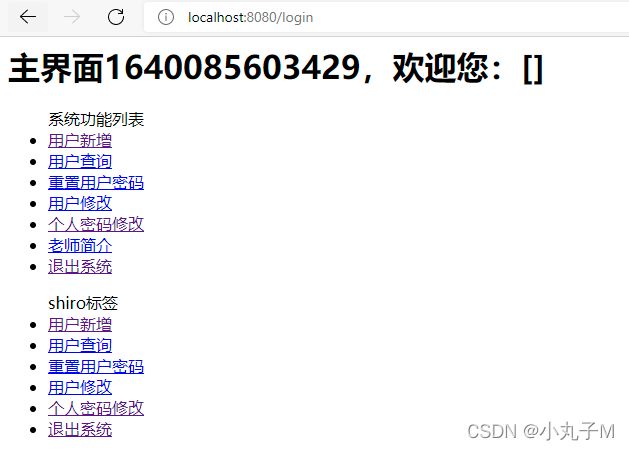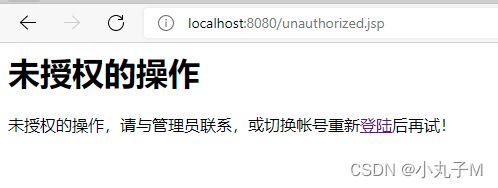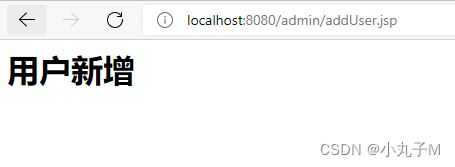Shiro认证-SSM
目录
一、盐加密
(一)Shiro环境配置与表生成
1、导入pom相关依赖
2、web.xml配置
3、通过逆向工程将五张表生成对应的model、mapper
4、增加通过账号查询用户信息的方法
数据库存储密码根本不知道是什么,安全系数增加
(二)md5加密
1、 md5加密:
2、 md5解密:
(三)Shiro加密
1、PasswordHelper(util包下) :
2、运行获得结果
二、Shiro认证
1、Myrealm.java
2、applicationContext-shiro.xml
3、ShiroUserController
4、导入相关jsp界面
5、 将applicationContext-shiro.xml交给spring进行管理
6、结果
一、盐加密
继续在ssm项目值续写
(一)Shiro环境配置与表生成
1、导入pom相关依赖
org.apache.shiro shiro-core 1.3.2 org.apache.shiro shiro-web 1.3.2 org.apache.shiro shiro-spring 1.3.2
2、web.xml配置
<filter>
<filter-name>shiroFilterfilter-name>
<filter-class>org.springframework.web.filter.DelegatingFilterProxyfilter-class>
<init-param>
<param-name>targetFilterLifecycleparam-name>
<param-value>trueparam-value>
init-param>
filter>
<filter-mapping>
<filter-name>shiroFilterfilter-name>
<url-pattern>/*url-pattern>
filter-mapping>
3、通过逆向工程将五张表生成对应的model、mapper
①、generatorConfig.xml
②、检查是否生成在ssm下面:
运行即可
4、增加通过账号查询用户信息的方法
①、ShiroUserMapper.xml:
②、ShiroUserMapper:
public ShiroUser queryByName(@Param("userName") String userName);
③、ShiroUserService
package com.mwy.service;
import com.mwy.model.ShiroUser;
import org.apache.ibatis.annotations.Param;
public interface ShiroUserService {
int deleteByPrimaryKey(Integer userid);
int insert(ShiroUser record);
int insertSelective(ShiroUser record);
ShiroUser selectByPrimaryKey(Integer userid);
int updateByPrimaryKeySelective(ShiroUser record);
int updateByPrimaryKey(ShiroUser record);
public ShiroUser queryByName(String userName);
}④、ShiroUserServiceImpl 实现ShiroUserService 接口
package com.mwy.service.impl;
import com.mwy.mapper.ShiroUserMapper;
import com.mwy.model.ShiroUser;
import com.mwy.service.ShiroUserService;
import org.springframework.beans.factory.annotation.Autowired;
import org.springframework.stereotype.Service;
//交给spring进行管理
@Service("shiroUserService")
public class ShiroUserServiceImpl implements ShiroUserService {
@Autowired
private ShiroUserMapper shiroUserMapper;
@Override
public int deleteByPrimaryKey(Integer userid) {
return 0;
}
@Override
public int insert(ShiroUser record) {
return 0;
}
@Override
public int insertSelective(ShiroUser record) {
return 0;
}
@Override
public ShiroUser selectByPrimaryKey(Integer userid) {
return null;
}
@Override
public int updateByPrimaryKeySelective(ShiroUser record) {
return 0;
}
@Override
public int updateByPrimaryKey(ShiroUser record) {
return 0;
}
@Override
public ShiroUser queryByName(String userName) {
return shiroUserMapper.queryByName(userName);
}
}数据库存储密码根本不知道是什么,安全系数增加
(二)md5加密
1、 md5加密:
密码都有相匹配的对应结果,而且不会改变,同样的密码只会生成一种结果
2、 md5解密:
md5的缺陷: 有破解工具,安全系数降低,
明文与密文一一对应的关系,明文加密成固定的密文;
(三)Shiro加密
盐加密工具类,在做新增用户的时候使用,将加密后的密码、及加密时候的盐放入数据库;
本篇博客中的表数据是现成的,暂时用不上这个工具类去生成数据;
1、PasswordHelper(util包下) :
密码工具类,加密1024次不能透露·,透露也就不安全了(因为一个明文对应一个密文,不断反推依旧能推出)
package com.mwy.util;
import org.apache.shiro.crypto.RandomNumberGenerator;
import org.apache.shiro.crypto.SecureRandomNumberGenerator;
import org.apache.shiro.crypto.hash.SimpleHash;
public class PasswordHelper {
/**
* 随机数生成器
*/
private static RandomNumberGenerator randomNumberGenerator = new SecureRandomNumberGenerator();
/**
* 指定hash算法为MD5
*/
private static final String hashAlgorithmName = "md5";
/**
* 指定散列次数为1024次,即加密1024次
*/
private static final int hashIterations = 1024;
/**
* true指定Hash散列值使用Hex加密存. false表明hash散列值用用Base64-encoded存储
*/
private static final boolean storedCredentialsHexEncoded = true;
/**
* 获得加密用的盐
*
* @return
*/
public static String createSalt() {
return randomNumberGenerator.nextBytes().toHex();
}
/**
* 获得加密后的凭证
*
* @param credentials 凭证(即密码)
* @param salt 盐
* @return
*/
public static String createCredentials(String credentials, String salt) {
SimpleHash simpleHash = new SimpleHash(hashAlgorithmName, credentials,
salt, hashIterations);
return storedCredentialsHexEncoded ? simpleHash.toHex() : simpleHash.toBase64();
}
/**
* 进行密码验证
*
* @param credentials 未加密的密码
* @param salt 盐
* @param encryptCredentials 加密后的密码
* @return
*/
public static boolean checkCredentials(String credentials, String salt, String encryptCredentials) {
return encryptCredentials.equals(createCredentials(credentials, salt));
}
public static void main(String[] args) {
//盐
String salt = createSalt();
System.out.println(salt);
System.out.println(salt.length());
//凭证+盐加密后得到的密码
String credentials = createCredentials("123", salt);
System.out.println(credentials);
System.out.println(credentials.length());
boolean b = checkCredentials("123", salt, credentials);
System.out.println(b);//true
}
}
2、运行获得结果
第一次运行:
第二次运行:
两次运行的结果都不相同,但同时都是123;安全系数高
二、Shiro认证
1、Myrealm.java
自定义Realm
Shiro从Realm获取安全数据(如用户、角色、权限),就是说SecurityManager要验证用户身份,那么它需要从Realm获取相应的用户进行比较以确定用户身份是否合法;也需要从Realm得到用户相应的角色/权限进行验证用户是否能进行操作;可以把Realm看成DataSource,即安全数据源。最基础的是Realm接口,CachingRealm负责缓存处理,AuthenticationRealm负责认证,AuthorizingRealm负责授权。
通常自定义的realm继承AuthorizingRealm
注1:体系结构见“shiro提供的realm.png”
AuthorizationInfo:授权信息
AuthenticationInfo:认证信息
继承AuthorizingRealm需要重写两个方法;重写授权与认证
package com.mwy.shiro;
import com.mwy.model.ShiroUser;
import com.mwy.service.ShiroUserService;
import org.apache.shiro.authc.AuthenticationException;
import org.apache.shiro.authc.AuthenticationInfo;
import org.apache.shiro.authc.AuthenticationToken;
import org.apache.shiro.authc.SimpleAuthenticationInfo;
import org.apache.shiro.authz.AuthorizationInfo;
import org.apache.shiro.realm.AuthorizingRealm;
import org.apache.shiro.subject.PrincipalCollection;
import org.apache.shiro.util.ByteSource;
import org.springframework.stereotype.Service;
public class MyRealm extends AuthorizingRealm {
private ShiroUserService shiroUserService;
public ShiroUserService getShiroUserService() {
return shiroUserService;
}
public void setShiroUserService(ShiroUserService shiroUserService) {
this.shiroUserService = shiroUserService;
}
//重写授权
@Override
protected AuthorizationInfo doGetAuthorizationInfo(PrincipalCollection principals) {
return null;
}
//重写认证
@Override
protected AuthenticationInfo doGetAuthenticationInfo(AuthenticationToken token) throws AuthenticationException {
System.out.println("身份认证...");
//token就是controller中的Login请求,subject.login(token);
String username = token.getPrincipal().toString();
// String password = token.getCredentials().toString();
ShiroUser user = shiroUserService.queryByName(username);
// 拿到数据库中的用户信息,放入token凭证中,用于controler进行对比
AuthenticationInfo info = new SimpleAuthenticationInfo(
user.getUsername(),
user.getPassword(),
ByteSource.Util.bytes(user.getSalt()),
this.getName()
);
return info;
}
}2、applicationContext-shiro.xml
MyRealm要交给spring进行管理需要在applicationContext-shiro.xml中进行配置
/user/login=anon
/user/updatePwd.jsp=authc
/admin/*.jsp=roles[admin]
/user/teacher.jsp=perms["user:update"]
3、ShiroUserController
在controller包下新增ShiroUserController(登录功能)
package com.mwy.controller;
import org.apache.shiro.SecurityUtils;
import org.apache.shiro.authc.UsernamePasswordToken;
import org.apache.shiro.subject.Subject;
import org.springframework.stereotype.Controller;
import org.springframework.web.bind.annotation.RequestMapping;
import javax.servlet.ServletException;
import javax.servlet.http.HttpServletRequest;
import javax.servlet.http.HttpServletResponse;
import java.io.IOException;
@Controller
public class ShiroUserController {
@RequestMapping("/login")
public String login(HttpServletRequest req, HttpServletResponse resp){
String username = req.getParameter("username");
String password = req.getParameter("password");
UsernamePasswordToken usernamePasswordToken = new UsernamePasswordToken(username, password);
Subject subject = SecurityUtils.getSubject();
try {
subject.login(usernamePasswordToken);
req.getRequestDispatcher("main.jsp").forward(req, resp);
} catch (Exception e) {
req.setAttribute("message", "您的用户名密码输入有误!!!");
try {
req.getRequestDispatcher("login.jsp").forward(req, resp);
} catch (ServletException e1) {
e1.printStackTrace();
} catch (IOException e1) {
e1.printStackTrace();
}
}
return null;
}
@RequestMapping("/logout")
public String logout(HttpServletRequest req, HttpServletResponse resp){
Subject subject = SecurityUtils.getSubject();
subject.logout();
try {
resp.sendRedirect(req.getContextPath()+"/login.jsp");
} catch (IOException e) {
e.printStackTrace();
}
return null;
}
}4、导入相关jsp界面
5、 将applicationContext-shiro.xml交给spring进行管理
6、结果
这与shiro入门测试结果一致,变化的是shiro入门用的是死数据(ini文件),
而这次用的是数据库数据
①、不填写登录
②、不同角色登录,查看到的功能各不相同
张三:
王五:
③、权限查看
王五登录点击用户新增显示界面
zdm登录点击用户新增界面
结束!!!





